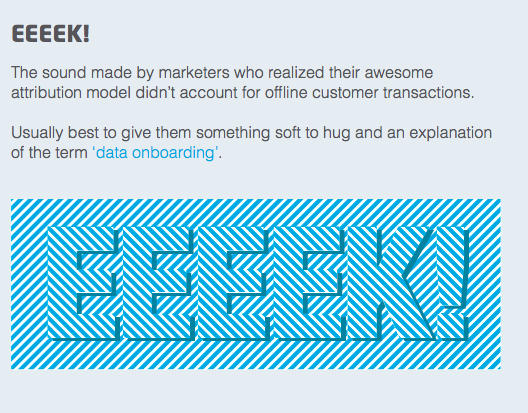Okay, so you’re in a complex, fast-changing market.
And at least one of the audiences you’re marketing to is kind of new to all this stuff.
Time to publish a Glossary.
I’ve always like well-produced glossaries and we’ve proposed them to lots of clients over the last few years. Finally, the smart folks at LiveRamp (the über-cool Acxiom company that connects data across the digital ecosystem) took us up on it.
Working with the LiveRamp team, we created The Official Data-Driven Marketer’s Glossary. We’re kind of proud of it. Why not go check it out, then pop back and we’ll share the thinking behind it. Sound like a deal? Off you go. Shoo. Git.
Here’s why we like glossaries so much:
—
- They’re useful – yes, these days people can Google any term they don’t understand, but putting a bunch of related terms together in one context (in this case, the digital ad tech context), is a service to your customers and prospects.
– - They signal selflessness – people instantly get that this is a reference for them, when they need it. Not a sales pitch.
— - They carry your world view – a simple definition sounds like a neutral thing, but in fact it can be a potent carrier of the building blocks of your story. It says, “This is how we want you to think about this thing.”
— - They can be good for SEO – if you do a really good one, and get people to link to it, you can rank not just on the glossary itself but on the terms it contains. The work doesn’t stop at publishing though — it starts there.
— - They can promote your content – acting kind of like an index piece, that links to lots of different, relevant content you’ve already got on your shelf.
— - They can (and should) be fun – glossaries don’t have to be dry. Harry kept this one light and friendly — and sprinkled in lots of winks. Like this one, under E:
—
The V studio also went a step further than illustrations to produce little animated gifs for some of the terms. Like the one at the top of the page and this one:

A few things to think about if you do a glossary:
- Pick the scope of your glossary carefully – it would have been hard to do a great job on a topic as big as digital marketing in general. But one on digital ad tech felt do-able. You don’t have to do a glossary that covers everything your company does. If you can pick off a smaller topic and create the best glossary on the web for it… that’s great.
- Think about how comprehensive you need to be – if you can pull off a really definitive glossary, go for it. But it can be good enough to pick, say, 50 key terms and focus on those.
- Think about whether you’ll update it – if the piece becomes popular, it makes sense to update it with new terms and new definitions for existing ones. But that’s an effort, so put enough work into the original one so that it warrants the upkeep.
- Think about whether there’s a gap for it – some areas are really, really well-covered. So pick one that isn’t over-done already. Remember, though, that having it on your site is a benefit to your visitors even if there are other good glossaries out there.
- Consider SEO hygiene – make sure the terms and definitions are on the web page itself, not sequestered in a pop-up light box. You might want to give each term its own page, too. We didn’t but it could be right for you. The Wine Enthusiast did it this way for their glossary of wine terms.
- Think about tone of voice – it’s easy to default to dictionary-speak when you do a glossary. That would be a shame. I prefer them when they’re more like friendly FAQs.
Some strong glossaries out there for you to geek out on:
Investopedia’s Investment Dictionary is really comprehensive and has cool features like Term of the Day, related terms, videos, most searched, recently added and Editor’s Picks. It’s clearly an evergreen asset for them and they’re investing in it (could you own the definitive one in your market?).
Twitter’s Glossary of Terms is short and simple, with clear illustrations from the app itself. Kind of half-assed if I’m honest but it gets points for simplicity.
Wikipedia’s Glossary of Nautical Terms is as comprehensive as you’d expect from a site entirely created and maintained by insanely generous (but also sometimes kind of creepy) volunteers. There are like a hundred terms under A alone.
The Digital Photography Review glossary is techie and meaty and illustrated, with each term on its own page and just an index of links on the home.
Know of any other good ones out there?

Enjoyed this article?
Take part in the discussion









Comments
There are no comments yet for this post. Why not be the first?